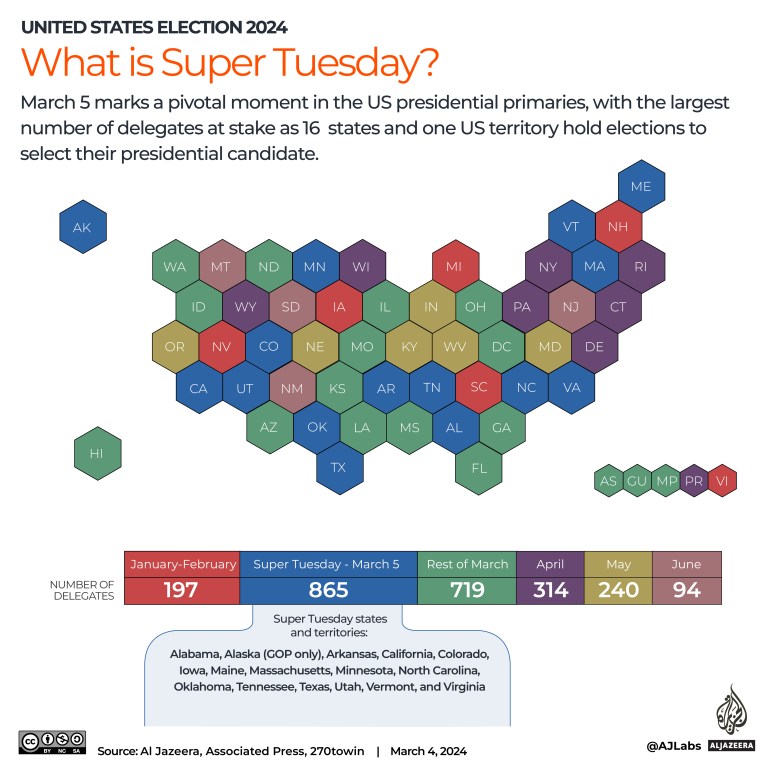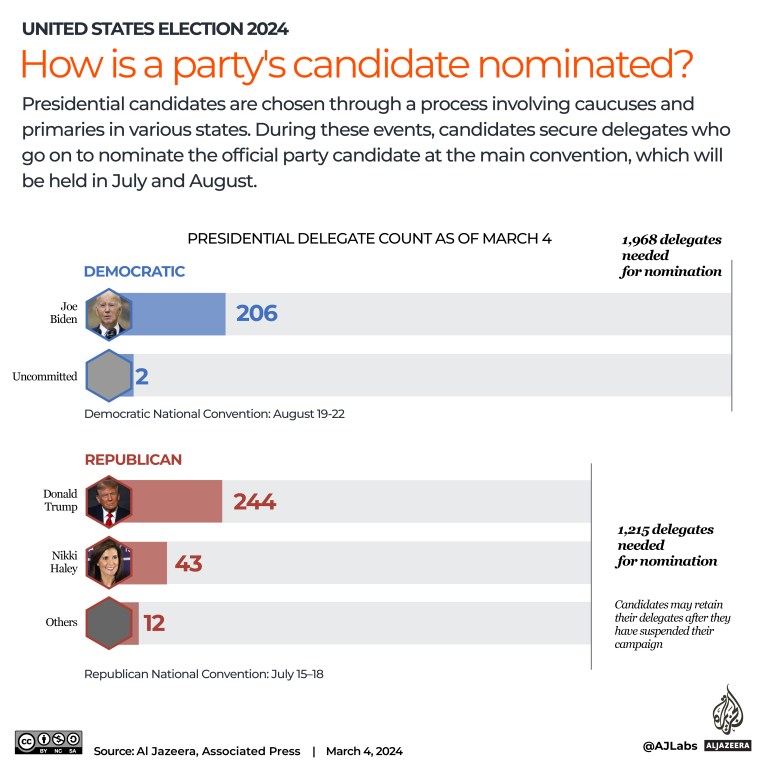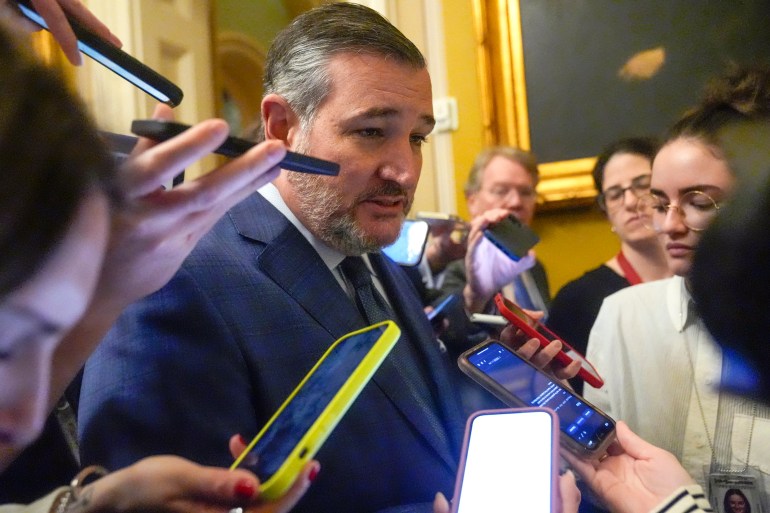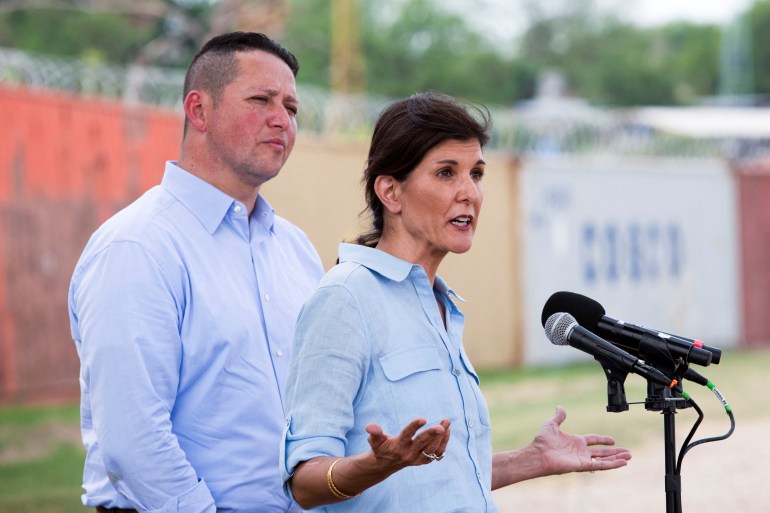Everything’s bigger in Texas — and that includes this year’s political primary races.
The second largest state in the United States — both in terms of population and land mass — Texas is set to hold votes this week for Super Tuesday, a pivotal juncture on the electoral calendar.

Fifteen states and one territory take to the polls on that day, which can be a make-or-break moment for presidential candidates.
But Texas looms particularly large as a window into the key issues facing candidates. Situated on the southern border, Texas has, in recent years, made headlines for grappling with immigration, gun violence and abortion access.
Both Democratic incumbent Joe Biden and Republican frontrunner Donald Trump will be on the ballot for Texas’s presidential primaries. But with their party nominations all but assured, experts are pointing to the down-ballot races as the most interesting of all.

Politicians will be vying for seats on the state’s Board of Education and in its legislature. Party nods for high-profile federal positions will be up for grabs, too. And in each case, the victors are expected to serve as weathervanes for the general elections.
With a strong tradition of Republican leadership, Texas is also set to be a litmus test for how loudly Trump’s influence over the party resonates.
“It’s important to always keep in mind that among the most influential and important red states is Texas,” said Mark Jones, a political science fellow at the Baker Institute for Public Policy in Houston.
“No one else really comes close in terms of the number of the Republican House members provided, in terms of electors in the Electoral College, and in terms of leading the opposition to the Biden administration.”
‘Principal official opposition’
With just under 30 million residents, Texas is seen as where the American South meets the West. Spread across 695,660 square kilometres (268,597 square miles), the state stretches from the humid coast of the Gulf of Mexico to the arid grasslands of its panhandle.
Its formidable economy is buoyed by fossil fuels, agriculture and aerospace: The state advertises itself as the eighth largest economy in the world.
And it has also come to be known as a Republican stronghold. Since the late 1970s, Republicans have dominated the governor’s mansion, only losing twice to single-term Democrats.
No Democrat has represented the state in the US Senate since 1993, and the last Democratic presidential candidate to win the state was Jimmy Carter in 1976.
Needless to say, Republicans have a tight grip on Texas power. And whenever a Democrat is in the White House, Texas “essentially assumes the role of principal official opposition”, Jones explained.
Governor Greg Abbott, for example, has long criticised Biden for his lack of action on immigration. Texas’s Attorney General Ken Paxton has sued the Biden administration for everything from its federal spending package to its policy of removing razor wire at the border.
The state, along with Republican-led Florida, has also set the pace in the so-called “culture wars”, with right-wing policies aimed at constricting certain types of education programmes and gender expression.
Over the last two years, for example, the Texas legislature has prohibited higher education from establishing diversity, equity and inclusion (DEI) offices; sought to restrict drag performances; and banned puberty blockers and hormone therapy for transgender children.
 Texas state Speaker of the House Dade Phelan is among the elected officials whose positions are up for grabs this Super Tuesday [Eric Gay/AP Photo]
Texas state Speaker of the House Dade Phelan is among the elected officials whose positions are up for grabs this Super Tuesday [Eric Gay/AP Photo]
Could Texas turn ‘purple’?
But just how far to the right Texas lands has long been a subject of debate.
For years, Democrats have eyed Texas’s shifting demographics as evidence that the state could tilt left. In 2022, Texas officially became a minority-majority state, with Hispanic residents surpassing whites. They account for more than 40 percent of the state’s population.
Still, Democrats have struggled to land victories in major statewide contests. In 2020’s presidential race, for instance, Biden lost Texas to Trump by five percentage points, in part because Hispanic residents near the border leaned towards the Republican candidate.
J Matthew Wilson, a political science professor at Southern Methodist University, said the belief that Texas could imminently become not red or blue but rather a purple swing state has dominated recent political discourse but has yet to fully materialise.
“Democrats have been talking about this for over a decade — this ‘purple Texas’ idea,” Wilson said. “And every election cycle, once again, Lucy yanks the football away from Charlie Brown.”
That reality, along with a history of drawing electoral maps to separate voters by political predilection, means the primary on Super Tuesday will hold disproportionate sway, according to Jones at the Baker Institute.
“Power and politics in Texas are decided in the primary,” Jones said, “especially the Republican primary.”
 Democrats are eyeing the seat of Republican Senator Ted Cruz as a possible point of weakness in November [Mark Schiefelbein/AP Photo]
Democrats are eyeing the seat of Republican Senator Ted Cruz as a possible point of weakness in November [Mark Schiefelbein/AP Photo]
Choosing a Senate contender
Still, Democrats have largely zeroed in on one statewide election they consider vulnerable: the race for the US Senate seat.
This year, Senator Ted Cruz is up for re-election, and the Super Tuesday ballot will decide who he faces as his Democratic rival.
Cruz, a polarising Republican with a national profile, nearly lost his last re-election bid in 2018 to dark-horse Democrat Beto O’Rourke.
A January poll from Emerson College and Nexstar Media put him in a statistical tie with either of this year’s Democratic contenders: Colin Allred and Roland Gutierrez. The Super Tuesday primary will decide whether Allred or Gutierrez advances to the final match-up.
Allred, a US representative from north Texas, represents a more centrist strain of Democrat. He has criticised Biden as being too soft on the border and staunchly supports Israel in its war in Gaza.
Gutierrez, meanwhile, has hewed progressive. A state senator, he has foregrounded gun control and humane border policies in his campaign. He also supports a ceasefire in Gaza.
Whichever candidate emerges as the champion in Super Tuesday’s primary will indicate the direction of the state’s Democratic Party, according to Rebecca Deen, a political science professor at the University of Texas at Arlington.
Still, she warned the general election would remain an uphill battle: “Incumbents are hard to beat.”
Gerrymandering at the polls
But other federal-level positions are at stake in the primary, too. Super Tuesday is set to be a winnowing ground for the race to control the US House of Representatives.
Every seat in the House is on the ballot this November. Super Tuesday, however, decides which candidates in Texas receive their party nods to proceed to the general election.
But to understand those votes is to understand Texas’s electoral map. Texas is widely considered to be one of the most gerrymandered states in the country.
Gerrymandering refers to drawing electoral districts in a way that favours one party. Each electoral district ultimately sends a representative to the House, and gerrymandering can help tweak the balance of power.
The practice is often considered unconstitutional, particularly when it reflects racial discrimination. But defining when that threshold is met is largely up to courts.
Experts say that gerrymandering has left Texas with districts that are either solidly Republican or solidly Democrat, with the former far outnumbering the latter. Meanwhile, the number of districts considered truly competitive continues to shrink.
After Texas’s Republican-controlled legislature passed a new redistricting map in 2021, the Brennan Center for Justice, a progressive nonprofit, found that the number of competitive districts dwindled from 12 to three.
Deen, the political science professor, explained that gerrymandering can mean that the politicians ultimately elected to the House are not necessarily representative of the state as a whole.
She added that the same holds true for the Texas state legislature, for which elections are also run on a district scale.
“The state writ large is actually pretty heterogeneous and complex,” Deen said. “It’s just that, because we have a gerrymandered state Senate and House districts and gerrymandered congressional districts, you end up with the people we have in power.”
 US Representative Tony Gonzales, seen here with Republican presidential candidate Nikki Haley, has faced censure from his own party [Kaylee Greenlee Beal/Reuters]
US Representative Tony Gonzales, seen here with Republican presidential candidate Nikki Haley, has faced censure from his own party [Kaylee Greenlee Beal/Reuters]
A test for Trump’s movement
One House race that has generated particular attention is centred on a district in the suburbs of the Dallas-Fort Worth area, a major metropolis.
Wilson, the professor at Southern Methodist University, pointed out that the district’s Super Tuesday primary field was particularly crowded — and telling. Eleven Republican candidates are competing to advance to the general election, with two who have emerged as frontrunners: Brandon Gill and John Huffman.
The contest is set to test how much Trump’s far-right Make America Great Again (MAGA) movement has reshaped the Republican party, Wilson explained.
Gill, 29, is a Trump-endorsed New York transplant who did marketing for the election conspiracy film 2000 Mules, written and directed by his father-in-law Dinesh D’Souza, a right-wing firebrand.
Huffman, on the other hand, is a former mayor from the city of Southlake who has come to represent the pre-Trump Republican Party.
“You have a variety of places where MAGA-movement conservatives are going up against more establishment figures,” Wilson said.
He added that Trump’s endorsement of Gill echoed his strategy in the 2022 midterm elections, when he backed several fringe candidates over more “mainstream” choices, with mixed results. An anticipated “red wave” at the ballot box that year turned out to be more of a ripple.
“Mainstream Republicans still have an advantage in Texas [over Democrats] and will for a while, but if the party drifts further into the MAGA direction, I think that makes things more competitive, and we’ll see closer races this fall,” he said.
Another race set to test Trump’s dominance over the party comes further south, in a district that includes border towns like Eagle Pass and cities like Uvalde, the site of a 2022 school shooting that killed 19 children and two teachers.
Incumbent Representative Tony Gonzales represents a less hardline vision for the Republican Party: He has supported limited gun control measures, for instance. He has also signalled a willingness to work across the aisle on issues like immigration.
But his propensity for compromise has led him to be censured: The state Republican Party penalised him for a “lack of fidelity to Republican principles and priorities”.
As Super Tuesday approaches, four Republican challengers have emerged to battle Gonzales for his seat. His top fundraising opponent is Brandon Herrera, a gun rights activist who styles himself on social media as the “AK Guy”, a reference to a brand of assault rifle.
Local elections, big implications
Even the races for state and local-level offices have come to reflect the fault lines in the Republican Party, as moderate candidates fight for political survival.
Deen, the political science professor, said these smaller races may seem like “a strange little brew of things that you might, on one hand, see as just family squabbles”.
But she emphasised they, too, can have broad implications — for the Republican Party in Texas and elsewhere.
“There is a connection to the larger angst that the Republican Party is having in terms of the Never Trumpers,” Deen said.
The Republican primary race for the Texas state House of Representatives offers one such example. The speaker of the state House, Dade Phelan, has found his position challenged by his fellow Republicans.
A relative moderate, Phelan faced calls for his resignation after he led the state House in voting for the impeachment of the far-right Attorney General Paxton. Trump has since thrown his weight behind Phelan’s challenger David Covey.
Jones, the Baker Institute fellow, said that — if Phelan and his fellow moderates are removed from the state House of Representatives — it could mark a definitive victory for the far right.
“The only breaks right now on the more conservative wing of the Republican Party come from the [state] House,” Jones explained. “And that could get eliminated this primary cycle.”
∎